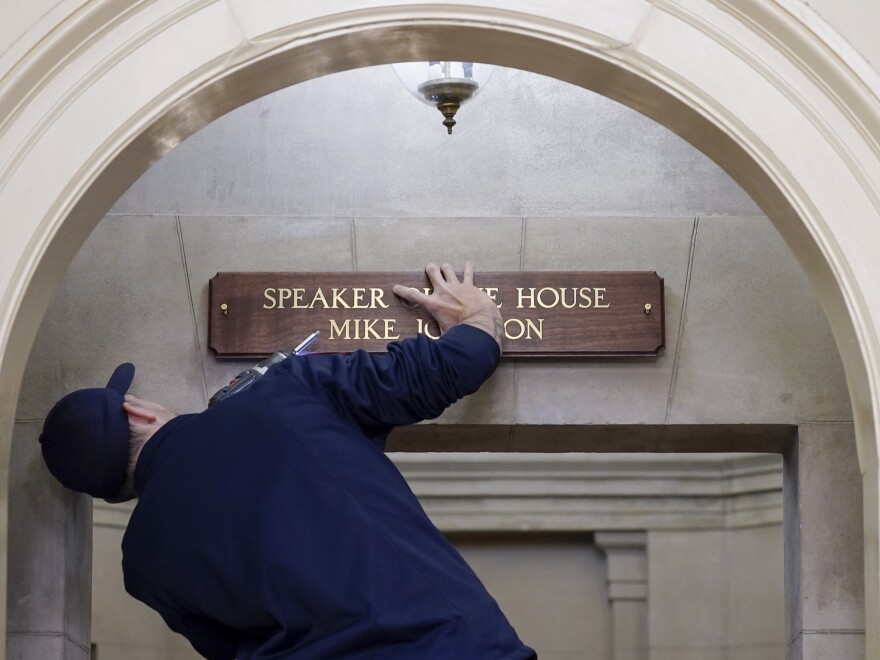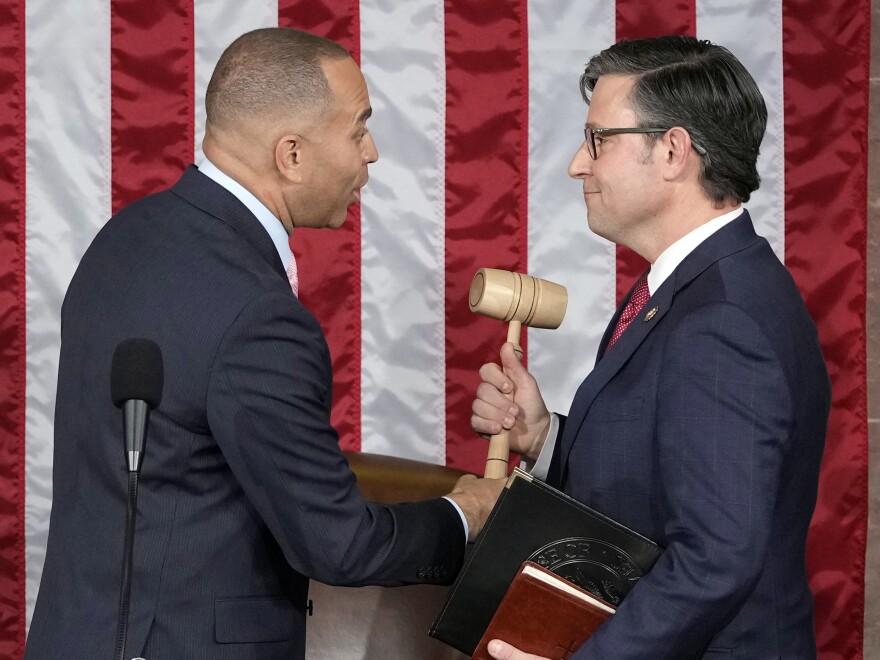Updated October 25, 2023 at 3:12 PM ET
Republicans have elected Rep. Mike Johnson, R-La., to be speaker of the House, ending a three-week vacancy that brought legislative work to a halt and plunged the conference into disarray. The vote was 220-209 with all Republicans voting for Johnson.
"When our people are losing their faith in government, when they're losing sight of the principles that made us the greatest nation in the history of the world, we have to be mindful of that," Johnson said in a speech after the vote. "We are going to fight, we're going to fight vigorously over our core principles because they're at odds a lot of times now in this modern era. We have to sacrifice, sometimes, our preferences because that's what's necessary in a legislative body, but we will defend our core principles to the end."
Johnson moved quickly after his election to restart the legislative business of the House with a vote on a resolution in support of Israel.
"We are going to show not only Israel, but the entire world that the barbarism of Hamas that we have all seen on our television screens is wretched and wrong," Johnson said. "We are going to stand for the good in that conflict."
He also called on Congress to address the situation at the U.S. border with Mexico, combat inflation and curb federal spending.
Watch Rep. Mike Johnson's first floor speech as House speaker:
Johnson was the first of four Republican nominees who could secure enough support from within his party to win a majority of votes on the House floor.
Johnson will take office with just over three weeks before government funding expires on Nov. 17, and a week after President Biden requested a $106 billion aid package for Israel, Ukraine, border security funding and other foreign policy goals. He will face the same challenge that ousted Speaker Kevin McCarthy, R-Calif., did ahead of an earlier funding deadline: How to govern a fractious conference that includes conservative hardliners and members in swing seats with a razor-thin majority.
Who is Mike Johnson?
Johnson is currently the vice chair of the House Republican Conference. It is a lower-tier elected leadership position. Johnson is also known within the conference as the former chair of the Republican Study Committee, a large group of fiscal conservatives.
He also served on the team that defended former President Donald Trump in his first impeachment inquiry. Johnson voted against certifying the 2020 election results, and was one of the members of Congress who filed an amicus brief in 2020 in support of a lawsuit asking the Supreme Court to invalidate the election results in four key swing states that helped Joe Biden win. The lawsuit cited widespread fraud, which did not occur.

How did we get here?
Johnson was nominated by House Republicans late Tuesday after another chaotic day on Capitol Hill. Earlier Tuesday, Republicans had selected Majority Whip Tom Emmer, R-Minn., to be their nominee, but Emmer withdrew from the race hours later after failing to win 217 votes within the conference. Emmer struggled to win the support of conservative hardliners, who favored Rep. Jim Jordan, the conference's previous pick. Emmer's bid was essentially doomed after Trump called him a "RINO" on his social media platform, Truth Social, writing that Emmer was "totally out-of-touch with Republican Voters," and supporting him would be a "tragic mistake." Trump ally Steve Bannon also attacked Emmer on his podcast Tuesday, calling him "essentially a Democrat."
But the former president was quick to embrace Johnson's win, posting his congratulations on his Truth Social platform: "He will be a GREAT 'SPEAKER.' MAKE AMERICA GREAT AGAIN!"
The mood around Johnson's nomination was far lighter than previous ones. Republicans held a brief, celebratory press conference in the room where lawmakers had huddled for their closed-door, secret ballot nominations. Members chanted "Mike" as reporters tried to ask questions.
Johnson was able to thread a needle that previous speaker candidates could not: The initial nominee, Majority Leader Steve Scalise, R-La., could not win support of conservative hardliners that preferred Judiciary Chair Jordan, R-Ohio. Then Jordan, the party's second nominee, could not win over a bloc of members opposed to his candidacy — a mix of veteran appropriators concerned about his record on government spending bills, members from districts Biden won in 2020, and allies of Scalise and McCarthy upset over how they were treated.
Johnson, a Christian conservative, had the bonafides to win over the hardliners, without the baggage that tanked Jordan's candidacy. Jordan is one of the most fervently far-right members of the House Republican conference, and was a founding member of the House Freedom Caucus. He gained a national profile as one of Trump's biggest defenders during his two impeachments. He has voted against government spending deals, bipartisan farm bills and emergency aid packages, and was part of a group of Republicans pushing to defund Obamacare back in 2013 in a fight that led to a government shutdown.
Johnson shares Jordan's conservative views and allegiance to Trump, but has a less combative persona and more allies across the ideological spectrum.
Rep. Ken Buck, R-Colo., who voted to oust McCarthy and opposed Jordan's candidacy, predicted ahead of the vote that Johnson would be able to succeed because he "has the least enemies in this conference."
"In addition to being abundantly qualified, he just is one of those nice people that builds coalitions and doesn't make people unnecessarily mad," Buck said.
An immediate test for the new speaker
Johnson will immediately face an intense test of his leadership. The federal government will run out of money on Nov. 17 — just over three weeks from now. McCarthy's decision to work with Democrats to pass a short-term spending bill and avert a shutdown is what triggered the push to oust him from the speakership in the first place.
Congress is also set to consider supplemental funding for national security concerns, including border security funding and assistance for Ukraine and Israel. In the past, Johnson has opposed money for Ukraine.
In a letter to his colleagues announcing his candidacy for speaker, Johnson cited the attacks on Israel and emboldened adversaries as two major challenges facing Congress, but did not provide specifics on what he would or would not bring to the floor. He also cited border security and the national debt as urgent issues to be addressed.
Biden congratulated Johnson in a statement Wednesday, and said he would try to work with him on "pressing issues," like passing his proposed aid package for Israel, Ukraine and the border.
"We need to move swiftly to address our national security needs and to avoid a shutdown in 22 days," Biden said.
Biden's campaign, on the other hand, called the new speaker "MAGA Mike Johnson" who is a "loyal foot soldier" for Trump.
"Extreme MAGA House Republicans elevated a man to second-in-line to the presidency who still won't admit President Biden won the 2020 election," Biden campaign spokesperson Ammar Moussa said in a statement.
Copyright 2023 NPR. To see more, visit https://www.npr.org.





